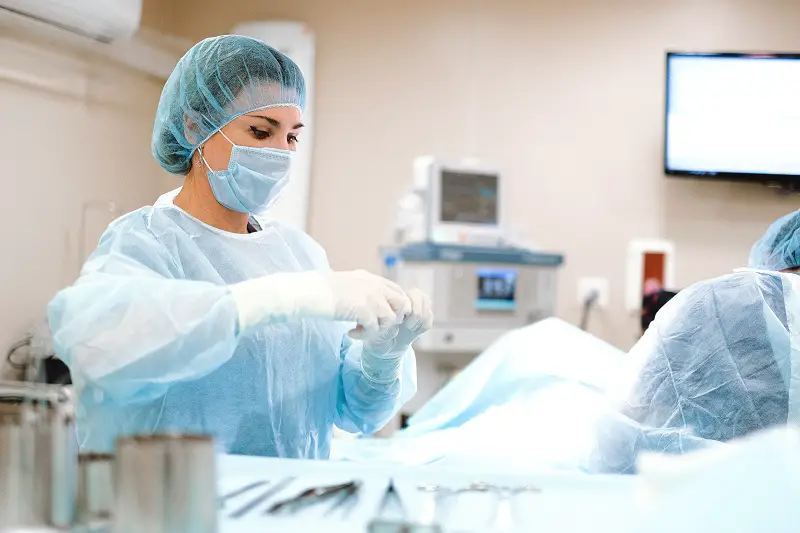Every hospital has a dozen of departments that some workers are not even aware of. The MICU and ICU are actually two different units that get most patients and new nursing students confused.
How are the MICU and ICU different? Do they perform different tasks and how can you be a nurse in the MICU and ICU?
What Is MICU?
MICU, which stands for medical intensive care unit, is a special unit in the hospital that cares for patients with an array of advanced conditions. The MICU must be staffed by nurses, doctors, and respective specialists at all times to ensure efficient support for the patients.
From rapid respiratory diseases to blood infections, MICU takes in patients with acute illnesses that can develop into life-threatening conditions.
The ward usually takes up an entire floor in the hospital for better management and organization, giving patients the quickest access should they need emergency surgery. Sometimes, the MICU is incorporated into the ICU to share resources.
What Is ICU?
ICU stands for intensive care unit. It is present in almost every large-scale general hospital. The ICU deals with patients in critical condition. These patients require 24/7 supervision to monitor their vitals.
In each ICU, there are surgery rooms reserved specifically for this unit as there is a constant need for emergency surgery. Surgical doctors, anesthetists, specialty nurses, and other medical experts are on-call day and night to handle a change in the person’s condition.
Hospitals do not mix ICUs with other units on the same floor to minimize delays in transportation and keep the floor traffic minimal. Larger ICUs will section off the ward for specialized fields such as accidents, contagious diseases, and surgery.
MICU vs. ICU: Which One is More Serious?
ICU handles more serious patients, whereas MICU handles the less critically ill. Both MICU and ICU are taking care of patients with conditions more severe than a general ward can handle so they are all dealing with life-threatening conditions.
The difference is that the patients in MICU can be considered less critically ill. They have advanced conditions that could potentially be fatal and require constant updates to make sure their conditions don’t worsen. These conditions are usually brought by long-term illnesses.
In the ICU, patients are on the brink of succumbing to their conditions. Hence, their vitals are monitored and treatment plans are updated regularly. These patients may develop acute symptoms from their conditions that require immediate surgery.
The ICU has the most expensive equipment and the widest range of specialists in one ward due to its complexity.
Unlike in general wards where all patients are monitored by the same machines, every piece of equipment in the ICU has its designated functions and is only used on patients with associated symptoms for the best observation.
The death rate in the ICU is typically higher than in the MICU because of its severity. The ICU is often classed as the most stressful ward in the hospital. Both MICU and ICU are staffed with similar medical experts.
Smaller hospitals may not have the resources to separate the two. Therefore, the ICU is more common and the MICU may not be present in every hospital.
MICU vs. ICU: Which One Handles More Patients?
Generally, the MICU is smaller in scale than the ICU. Since the MICU and the ICU can function similarly in nature, some hospitals combine the MICU in the ICU. In these cases, you will not find the presence of the MICU.
What Other Units Are in a Hospital?
Figuring out the acronym for every unit is an introductory lesson for every healthcare worker in the hospital. Abbreviations are widely used to save time and help patients navigate their way around.
Not every hospital will have these units and some hospitals will have more units or have their own very specialized units. These are some of the common units you will find in the hospital.
Emergency Room (ER)
Every patient being admitted to the hospital has to go through the ER first. The ER is the frontline of the hospital, sorting out patients according to the seriousness of their conditions. ER staff has to accurately identify corresponding symptoms and grade the condition accordingly.
Patients needing immediate assistance will be sent to the ICU or surgery room. ER doctors assess each patient’s physical state to determine if admission is required or if the patient can be discharged with a prescription.
Cardiac Care Unit (CCU)
The CCU specializes in heart diseases. Patients with complicated heart issues will be sent to the CCU to consult with specialists regarding open-heart surgery or other treatments. Experts will conduct a full assessment to determine the best treatment.
Operating Room (OR)
The surgery room is commonly referred to as the OR. A hospital will have standardized ORs for most smaller-scale surgeries. These standard ORs have the same equipment.
Specialized ORs are present for specialized wards and the ICU. The equipment may be different to meet the needs of more complicated surgeries.
Post-anesthesia Care Unit (PACU)
After the surgery, some patients will be sent to the PACU until their condition stabilizes after anesthesia. Not every patient who receives anesthesia will be sent to the PACU.
It depends on the surgery and the patient’s condition. It is also common for patients to be directly discharged from the PACU without moving to other general wards first.
Pediatric Intensive Care Unit (PICU)
Similar to the ICU, PICU focuses on patients with critical patients but for children. PICUs are usually only present in children’s hospitals as most hospitals will transfer underage patients to specialized hospitals for the best treatment.
Trauma Intensive Care Units (TICU)
The TICU focuses on patients with blunt-force trauma or penetrative wounds such as gunshots, stab wounds, and fight-related injuries. Many patients in the TICU are susceptible to infections.
Therefore, the TICU may have stricter visiting rules and more isolation rooms to protect patients with severe injuries.
Sometimes, the injuries are crime-related and there will be police officers guarding the TICU for security purposes. Those patients may also be separated from the rest of the ward in isolation rooms.
Neonatal Intensive Care Unit (NICU)
The NICU is sometimes confused with the PICU as it also focuses on child care. The difference is that the NICU specifically cares for unborn babies suffering from pre-birth conditions.
The NICU gives expert opinions to pregnant women on their existing health issues and monitors their baby’s condition.
Premature babies are also placed here for further assessment before they can be returned to the general ward. The NICU gives support to both the birth mother and the baby for other complications they may encounter during the pregnancy.
In children’s hospitals, the NICU is often separated from the PICU as the equipment required is different. The NICU is staffed with experts on birth defects and genetics to assess each patient’s condition to give the best treatment plan.
What Kind of Nurses Works in MICU and ICU?
Fresh graduates from nursing colleges do not possess the specific skill set for specialized units. They can be assigned to any unit in the hospital. Initially, student nurses will get rotations in different units to familiarize themselves with the daily work.
They may get placements in several wards throughout their academic years. During this time, students will develop a better sense of how each unit functions and what duties they are required to do.
After graduation, students could get hired by their former workplace and be assigned to units they interned at. Or the hospital will place them in other units based on staff availability. New nurses may not get to choose which unit they work in, although they could show preferences.
Once a nurse is familiar with the work in a ward, they will likely stay in the same ward. That’s usually how most MICU and ICU nurses started working here. Since both units require shift rotations, nurses have to agree to take up shifts or cover emergencies before they are hired.
For the MICU and ICU, it can be incredibly stressful and the turnover rate is often higher than other units due to the volume of patients each day. All patients are in critical condition and hospitals will allow nurses to opt out of these units.
How Can You be a MICU and ICU Nurse?
Dealing with patients with severe symptoms is stressful. Sadly, it is likely that half of the patients will never leave the hospital alive. Therefore, nurses working in MICU and ICU are often facing death and heartaches, making it one of the toughest nursing positions.
Other than the mental pressure, patients in both units need constant updates on their vitals for doctors to make suitable treatment plans.
Every change in their statistics has to be reported. Hospitals facing staff shortages have a serious problem of not having enough staff-to-patient ratio because the MICU and ICU need more nurses than other units.
Since working in the MICU and ICU is not for everyone, hospitals tend to ask for fresh graduates’ preferences before assigning them.
Some people do enjoy working here as it gives them better exposure to all kinds of work and advanced equipment. The experience can land them more nursing desirable jobs in the future, including in the private sector and medical consultant roles.
When you start at the MICU and ICU, you will work with the basics and will not be involved heavily in regulating the patients’ vital or their life-support machines.
Fresh graduates should not feel the responsibility to make decisions for these patients as they should be following the guidance of senior members.
After a few years of experience, MICU and ICU nurses will start working closely with doctors and resident experts on formulating treatment plans. Nurses are crucial in helping doctors understand the patient’s condition because they take the most intimate care for them.
Nurses should know more about the patient’s condition than others in the ward to let the patient’s family be aware of the current situation. They bare the responsibility to communicate and coordinate with everyone.
You need exceptional organizational skills as you will be handling several urgent tasks at the same time, such as arranging immediate surgery, alerting higher authority of serious issues, and coordinating with others to smooth the patient’s comfort level.
Being a MICU and ICU nurse is more than about providing exceptional medical care. You need to be all-rounded to handle unexpected situations and help everyone achieve the best results for the patient.
Work Schedule For MICU and ICU Nurses
Regardless of which specific unit you choose, it is certain that you will be asked to work in shifts. Senior members may be entitled to fixed shifts after some years but new nurses will work different hours.
A shift usually lasts for 12 hours and there are two shifts in each unit, one during the day and one during the night. Night shift nurses have to hand over reports and give care to patients when other daytime workers are not available.
The long hours are compensated with longer breaks. Depending on the hospital, nurses get two days off after three days at work and they must not exceed 40 hours per week unless they get overtime and are asked to cover for an emergency.
It is not uncommon for MICU and ICU nurses to have two consecutive shifts. So, they will be working for 24 hours straight without a break. The number seems daunting but is preferred by many nurses so they can get a longer break after.
Every schedule is decided by senior nurses in the team or the management unit. They may give priority to those working for a long time or unable to attend certain shifts due to legitimate reasons.
Summary
As a new nurse, learning all the abbreviations in the hospital is the first step. Both the MICU and ICU are intensive care units. If becoming a MICU or ICU nurse is your dream, you should now know exactly what to expect and how to get there.









